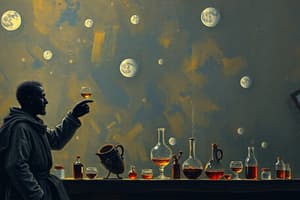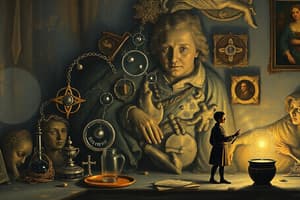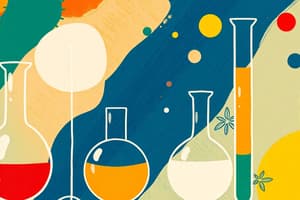Podcast
Questions and Answers
Which core principle of science emphasizes minimizing personal bias in the research process?
Which core principle of science emphasizes minimizing personal bias in the research process?
- Rationalism
- Objectivity (correct)
- Skepticism
- Empiricism
A researcher observes that plants grow taller when exposed to sunlight. According to the scientific method, what is the MOST logical next step?
A researcher observes that plants grow taller when exposed to sunlight. According to the scientific method, what is the MOST logical next step?
- Formulate a hypothesis about the relationship between sunlight and plant growth. (correct)
- Conclude that sunlight is essential for plant growth.
- Ignore the observation and focus on other research areas.
- Immediately publish the observation in a scientific journal.
Which branch of natural science is MOST directly concerned with the study of the composition, structure, properties, and reactions of matter?
Which branch of natural science is MOST directly concerned with the study of the composition, structure, properties, and reactions of matter?
- Earth Science
- Chemistry (correct)
- Physics
- Biology
In the context of science, what distinguishes a 'theory' from a 'hypothesis'?
In the context of science, what distinguishes a 'theory' from a 'hypothesis'?
Why is skepticism considered a core principle of science?
Why is skepticism considered a core principle of science?
Which of the following scenarios BEST exemplifies the application of rationalism in scientific inquiry?
Which of the following scenarios BEST exemplifies the application of rationalism in scientific inquiry?
A political scientist is studying voting behavior. Which branch of science does this research fall under?
A political scientist is studying voting behavior. Which branch of science does this research fall under?
Which activity exemplifies 'communication' as part of the scientific method?
Which activity exemplifies 'communication' as part of the scientific method?
Which of the following best describes the primary purpose of a scientific model?
Which of the following best describes the primary purpose of a scientific model?
A researcher records the temperature of a chemical reaction every minute using a thermometer. What type of observation is being made?
A researcher records the temperature of a chemical reaction every minute using a thermometer. What type of observation is being made?
Which of the following is the most significant reason for using control groups in experimental design?
Which of the following is the most significant reason for using control groups in experimental design?
Which activity exemplifies the principle of 'openness' in scientific research?
Which activity exemplifies the principle of 'openness' in scientific research?
A scientist is studying the effect of fertilizer concentration on plant growth. What is the independent variable in this experiment?
A scientist is studying the effect of fertilizer concentration on plant growth. What is the independent variable in this experiment?
Why is peer review an important part of the scientific communication process?
Why is peer review an important part of the scientific communication process?
Which of the following is a valid application of scientific notation?
Which of the following is a valid application of scientific notation?
Which of the following situations requires the use of inferential statistics?
Which of the following situations requires the use of inferential statistics?
A research study finds a strong correlation between ice cream sales and crime rates. What is the most appropriate conclusion?
A research study finds a strong correlation between ice cream sales and crime rates. What is the most appropriate conclusion?
Which of the following best illustrates the application of biotechnology?
Which of the following best illustrates the application of biotechnology?
Flashcards
What is Science?
What is Science?
A systematic approach to understanding the natural world through observation, experimentation, and analysis.
Empiricism
Empiricism
Knowledge is derived from sensory experience; relies on observable, measurable evidence.
Rationalism
Rationalism
Using logical reasoning to develop theories and explanations.
Skepticism
Skepticism
Signup and view all the flashcards
Objectivity
Objectivity
Signup and view all the flashcards
Observation
Observation
Signup and view all the flashcards
Hypothesis
Hypothesis
Signup and view all the flashcards
Scientific Theories
Scientific Theories
Signup and view all the flashcards
Scientific Law
Scientific Law
Signup and view all the flashcards
Scientific Model
Scientific Model
Signup and view all the flashcards
Measurement
Measurement
Signup and view all the flashcards
SI Units
SI Units
Signup and view all the flashcards
Scientific Notation
Scientific Notation
Signup and view all the flashcards
Statistics
Statistics
Signup and view all the flashcards
Variables
Variables
Signup and view all the flashcards
Control Group
Control Group
Signup and view all the flashcards
Scientific integrity
Scientific integrity
Signup and view all the flashcards
Peer Review
Peer Review
Signup and view all the flashcards
Study Notes
- Science is a systematic and organized approach to understanding the natural world through observation, experimentation, and analysis.
- Its main goal is to discover facts and relationships and to formulate laws and theories.
Core Principles
- Empiricism states that knowledge is primarily derived from sensory experience.
- Science relies on evidence that can be observed or measured.
- Rationalism involves using logical reasoning to develop theories and explanations.
- Skepticism is crucial; scientific claims must be questioned and tested.
- Objectivity means striving to minimize bias and personal beliefs in the scientific process.
Scientific Method
- Observation is the first step; it involves noticing phenomena and asking questions.
- Hypothesis is the formulation of a testable explanation or a prediction.
- Experimentation involves designing and conducting controlled tests to gather data.
- Analysis involves interpreting the data to determine whether it supports or refutes the hypothesis.
- Conclusion involves summarizing the findings of the experiment and determining whether the hypothesis is supported by the evidence.
- Communication includes sharing the results through scientific publications and presentations.
Branches of Science
- Natural Sciences study the physical world.
- Physics examines the fundamental laws governing matter, energy, space, and time.
- Chemistry investigates the composition, structure, properties, and reactions of matter.
- Biology explores the study of living organisms, including their structure, function, growth, origin, evolution, and distribution.
- Earth Science studies the Earth's structure, properties, processes, and its place in the universe.
- Social Sciences involve the study of human behavior and societies.
- Sociology studies social behavior, institutions, and structures.
- Psychology studies mental processes and behavior.
- Economics studies the production, distribution, and consumption of goods and services.
- Political Science studies the theory and practice of politics and government.
- Formal Sciences use formal systems to generate knowledge.
- Mathematics studies numbers, quantities, shapes, and their relationships.
- Logic studies the principles of valid reasoning and inference.
- Computer Science studies computation, automation, and information.
Scientific Theories and Laws
- Theories provide broad explanations or frameworks for understanding the world.
- Theories are well-substantiated explanations acquired through the scientific method and repeatedly tested and confirmed through observation and experimentation.
- Laws are descriptive generalizations about how the natural world behaves under specific conditions.
- Laws are typically expressed as mathematical equations.
- Models are representations of objects, systems, or ideas that help scientists understand and make predictions.
Measurement and Units
- Measurement is the process of assigning numbers or values to physical quantities.
- The International System of Units (SI) is the standard system of units used in science.
- SI base units include meter (m) for length, kilogram (kg) for mass, second (s) for time, ampere (A) for electric current, kelvin (K) for temperature, mole (mol) for amount of substance, and candela (cd) for luminous intensity.
- Scientific notation is used to express very large or very small numbers.
- Uncertainty is an inherent aspect of measurement, reflecting the limitations of instruments and techniques.
Data Analysis
- Statistics is the science of collecting, analyzing, interpreting, and presenting data.
- Descriptive statistics summarize and describe the main features of a dataset.
- Inferential statistics involve making predictions or generalizations about a population based on a sample.
- Graphs and charts are used to visually represent data and relationships.
Tools and Technologies
- Instruments are used to make observations and measurements.
- Microscopes are used to view small objects and structures.
- Telescopes are used to observe distant objects in space.
- Spectrometers are used to analyze the properties of light.
- Computers are used for data analysis, modeling, and simulation.
- Laboratory equipment such as beakers, test tubes, and centrifuges are used in experiments.
Ethics in Science
- Integrity is the adherence to honest and ethical principles in research.
- Objectivity is minimizing bias in the design, conduct, and reporting of research.
- Openness involves sharing data, methods, and results transparently.
- Credit involves giving proper acknowledgment to the contributions of others.
- Social responsibility involves considering the potential impacts of research on society.
Science and Society
- Science plays a crucial role in addressing societal challenges such as climate change, disease, and energy.
- Technology is the application of scientific knowledge for practical purposes.
- Innovation is the development of new products, processes, and technologies.
- Science education is essential for promoting scientific literacy and preparing future scientists.
- Public understanding of science is important for making informed decisions about science-related issues.
Experimental Design
- Control groups are used as a baseline for comparison in experiments.
- Variables are factors that can change or be changed in an experiment.
- Independent variables are manipulated by the researcher.
- Dependent variables are measured to see how they are affected by the independent variable.
- Controlled variables are kept constant to prevent them from influencing the results.
- Randomization involves assigning subjects to different groups randomly to reduce bias.
- Replication involves repeating an experiment multiple times to ensure the results are reliable.
Observation Techniques
- Qualitative observations involve describing qualities or characteristics.
- Quantitative observations involve measuring quantities or amounts.
- Direct observation involves observing phenomena firsthand.
- Indirect observation involves using instruments or tools to make observations.
- Remote sensing involves collecting data from a distance, such as through satellite imagery.
Scientific Communication
- Peer review is the process by which scientific papers are evaluated by experts in the field before publication.
- Scientific journals publish original research articles, reviews, and other scholarly content.
- Conferences provide a forum for scientists to present their work and exchange ideas.
- Science popularization involves communicating scientific information to the general public through books, articles, and other media.
History of Science
- Ancient science includes contributions from civilizations such as the Egyptians, Babylonians, and Greeks.
- The Scientific Revolution was a period of major scientific advancements in the 16th and 17th centuries.
- Modern science emerged in the 18th and 19th centuries with the development of new theories and technologies.
- Key figures in the history of science include Isaac Newton, Albert Einstein, Marie Curie, and Charles Darwin.
Frontiers of Science
- Nanotechnology involves manipulating matter at the atomic and molecular level.
- Biotechnology involves using living organisms and biological systems to develop new products and technologies.
- Artificial intelligence involves creating machines that can perform tasks that typically require human intelligence.
- Space exploration involves exploring and studying the universe beyond Earth.
- Quantum computing involves using quantum mechanics to solve complex problems.
Studying That Suits You
Use AI to generate personalized quizzes and flashcards to suit your learning preferences.




